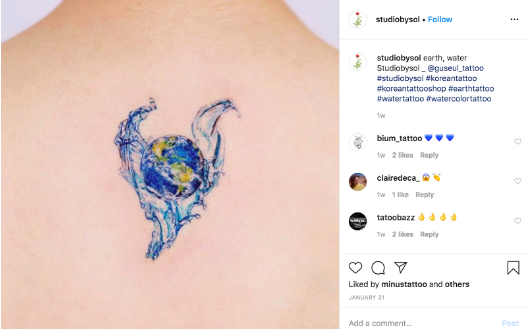DANICA CREAHAN WRITES– To the nearly half a million people who follow @studiobysol on instagram, the fact that most tattooing is illegal in South Korea might come as a shock. Located in Seoul, South Korea’s capital, Studio by Sol is comprised of 29 tattoo artists, each with individual follower counts in the thousands. This studio, and many like it in and around Seoul, have gained so much online attention that some tourists go there simply to get inked. They may never think about the illegality of tattooing or the risk these artists take to produce their unique style of art.
Since 1992, the government of South Korea has enforced a law that restricts tattoo privileges to licensed medical professionals.”Tattooing is a medical act that can pose a danger to the human body if it’s allowed for non-medical personnel,” an official from the Korean Medical Association told Korea Biomedical Review back in 2017. Historically, Korean culture has associated tattoos with gangs and violence, and remnants of these negative associations remain among older generations.
“In particular, the paints currently used in tattoos are not scientifically proven to be safe,” said Professor Kim Won-seok of the Sungkyunkwan University School of Dermatology, also speaking to Korea Biomedical Review. “As the number of lung cancer surgeries increases, doctors don’t recommend their patients to smoke tobacco. We should apply the same caution to tattooing.” Though getting tattooed can be therapeutic for some, there is risk involved if an artist is careless about following standard sterilization procedures. South Koreans in fact see tattooing as science, not art.
Despite legal restrictions, South Korea harbors a thriving community of “underground” tattoo artists. Entering Studio by Sol, one might mistake it for a cafe or oddly barren art gallery—except for the steady flow of customers. This creates a Catch-22 situation: while tattooing done the South Korean way is completely legal, very few licensed medical professionals maintain such studios. The result: a thriving but illegal business. Underground studios are no secret but are harder to locate for lack of signage. Still, law enforcement officials wanting to crack down know where to find them by tracking crowds of customers walking past them every day. Back in 2017, in fact, the publication Roads and Kingdoms estimated that there were around 20,000 illegally operating tattoo artists in South Korea.
Is it time for a revolution? The Korean Tattoo Association argues that tough tattooing laws defy the constitutional right of every Korean to freely choose their vocation. Shouldn’t Korean lawmakers reclassify tattooists without medical licenses as artists instead of criminals? Or is the cultural taboo for the taboo too firmly engrained on the surface of Korean culture?


One Reply to “SEOUL, SOUTH KOREA: FEWER TABOOS FOR TATTOOS?”